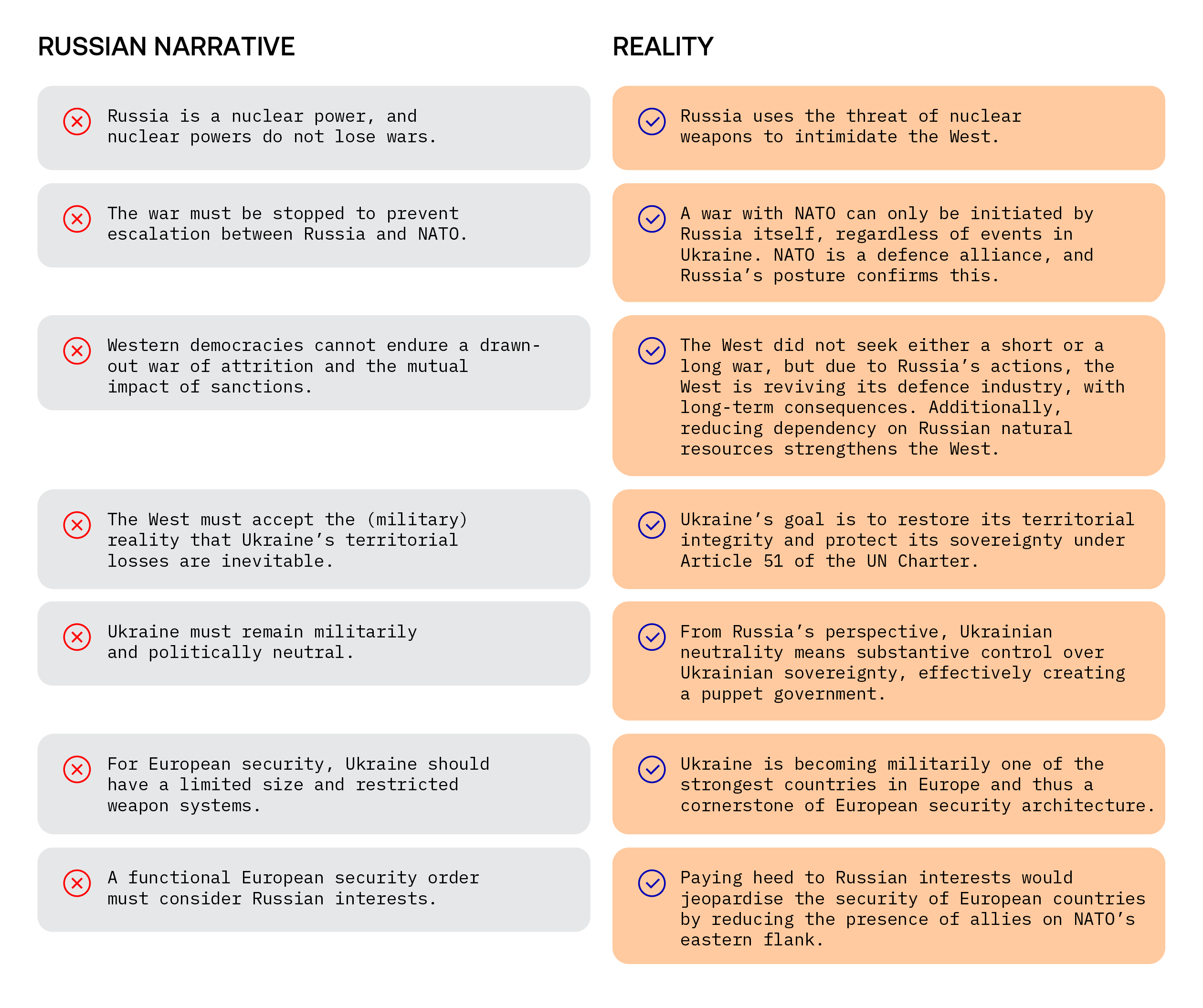3.1
The impact of the war in Ukraine on European security
Putin aims to secure victory in Ukraine to demonstrate geopolitical superiority over the West and reshape the European security landscape. Submitting to Russia's ambitions threatens Estonian and European security.
Putin believes time is on his side, counting on Western and Ukrainian fatigue. However, Western nations should not overestimate Russia's strategic planning.
As an intermediate goal, Russia would likely prefer to freeze the conflict on its own terms. To achieve this, Russia employs inter alia nuclear intimidation and covert communication.
Putin’s goal is to win the war with Ukraine, but his definition and parameters of victory are not fixed and may evolve with military developments. Putin can interpret any territorial expansion as a victory, which will essentially provide further incentives for aggression against neighbouring sovereign states and set the stage for future expansion. Additionally, Russia wants to demonstrate to the West its military and political superiority. As the war persists, the urgency of this need grows because the Kremlin must increasingly demonstrate that the war transcends a mere conflict between two nations and represents a clash of two systems: Russia and the West.
Russia likely expects the conflict to end through negotiations, which may lead to a ceasefire or freezing of the conflict. Through a war of attrition, the Kremlin aims to create a negotiation situation where Ukraine is compliant and the West is willing to accommodate Putin’s demands. Putin is likely willing to accept an immediate ceasefire if Ukraine is ready to end hostilities and accept territorial losses. In negotiations, Russia is likely to insist on de facto control of the occupied territories, Ukraine’s exclusion from NATO membership and restrictions on weapon systems perceived as a security threat by the Kremlin. For Putin, a frozen conflict in Ukraine is an interim solution that must serve the ultimate goal of gaining political control over Ukraine.
Even if Putin doesn’t get everything he wants through negotiations, Russia will rely on its past experience and conviction that compromise and acceptance of unfavourable conditions are only temporary. With time to accumulate power, Russia can launch another attack on Ukraine.
For Russia, negotiations over Ukraine are multilateral, not bilateral. The West, especially the United States, must be involved in negotiations to determine not only Ukraine’s future but also the broader European security situation. Putin has not abandoned his goal of redefining the European security system and will likely test updated demands similar to those presented to NATO at the end of 2021. Russia would see a victory in Ukraine as a green light to reshape the European security environment and as part of a broader challenge to Western rules- and value-based principles and order.
At the same time, it is essential to avoid overestimating Russia’s capabilities and strategic planning. The war of attrition is not an end in itself but a consequence of Ukraine’s resilience and resistance. Putin has not achieved his declared goals in this war of aggression, including bringing Donbas under his control. Russia believes that time is on its side in the war with Ukraine. But only if the West tires. Therefore, the Kremlin is placing its bets on war fatigue in the West and is working to amplify it. Putin calculates that without sufficient Western support, Ukraine will find it challenging to withstand Russia in the long term and achieve strategic success.
Due to the war, the Kremlin must try to shape a favourable information environment. Russia uses various means to do this, including public communication, political and diplomatic channels, and covert communication. Russia seeks to test and normalise possible parameters for a frozen conflict through unofficial channels. Russia uses both its established network of “useful idiots” and the Western expert community for this purpose.
Russia seeks to influence Western decision-makers and populations by threatening escalation and using nuclear intimidation. As a rule, Russian regime figures convey these messages, but more specifically, targeted methods include using recognised opinion leaders, journalism and conferences. Russia calculates that Western countries will be willing to make concessions in reshaping the European security environment to secure Russia’s return to the image of a responsible nuclear power.
The core of nuclear intimidation is rhetoric, accompanied by actual steps to deploy the relevant weaponry. An example of this strategy is the potential deployment of nuclear weapons in Belarus, where Russia could gain an advantage over Western countries with relatively modest resources. This would enable Russia to exploit the situation flexibly to further its own interests.
The war in Ukraine has limited Russia’s conventional military capabilities on the Western strategic direction. To compensate, Russia will likely rely even more on
nuclear intimidation and the development of military capabilities in the future. One such measure in the Baltic Sea region is reinforcing units in the Kaliningrad Oblast and securing the infrastructure to guarantee their nuclear strike capability.
THE PARAMETERS OF A FROZEN CONFLICT – NARRATIVES
PROMOTED BY RUSSIA THAT WOULD NEGATIVELY AFFECT ESTONIAN
AND EUROPEAN SECURITY
